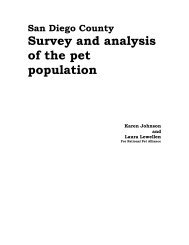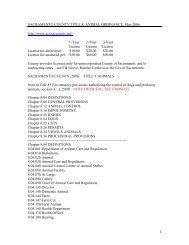Page 1 of 330 The Monthly National Legislation Report 7/5/2010 ...
Page 1 of 330 The Monthly National Legislation Report 7/5/2010 ...
Page 1 of 330 The Monthly National Legislation Report 7/5/2010 ...
Create successful ePaper yourself
Turn your PDF publications into a flip-book with our unique Google optimized e-Paper software.
<strong>The</strong> <strong>Monthly</strong> <strong>National</strong> <strong>Legislation</strong> <strong>Report</strong>http://mnlreport.typepad.com/<strong>Page</strong> 235 <strong>of</strong> <strong>330</strong>7/5/<strong>2010</strong>likely ask veterinarians to help institute the program. <strong>The</strong> county could generate about $70,000 to $75,000 annually through the new licenses. Pets that aren’t licensed could be impounded.the licensing law would make “allowances for hunters.” Kennels that breed animals would require permits and rabies vaccinations for all cats and dogs. <strong>The</strong> exception would be boarding-onlykennels. Any reports <strong>of</strong> “injurious or threatening” behavior by a dog in the 12 months preceding the permit or license application would result in its rejection, the proposed ordinance states.Other requirements pertain to the treatment <strong>of</strong> animals and conditions at the kennel. If a kennel doesn’t comply, it could be issued a citation requiring compliance. It would be amisdemeanor to violate the kennel ordinances.Raleigh - (4/27/09) - North Carolina's meat industries are battling a bill the Humane Society <strong>of</strong> the United States and its vegan president say is meant to protect puppies, warning instead thatit is the first step toward ending meat eating as we know it. <strong>The</strong> Humane Society has made North Carolina a top priority in the fight for tougher animal welfare laws, for the first timedeploying a lobbyist to work a full session <strong>of</strong> the state legislature. Agribusiness groups predict a repeat <strong>of</strong> the tighter farm animal laws that California approved last year in a Humane Societybackedvoter referendum. That measure included a requirement that egg-laying hens live in an area big enough for them to extend their wings, a mandate that opponents said was so costprohibitive it would drive egg producers out <strong>of</strong> business. “<strong>The</strong> public is very unaware that the Humane Society <strong>of</strong> the United States has a very direct agenda to eliminate the use <strong>of</strong> animals forfood,” said Kay Johnson, executive vice president <strong>of</strong> the Animal Agriculture Alliance, a livestock industry-supported group based in Washington. “Nobody would have steak, hamburger, eggs –everyone would have a vegan diet.” Those words can stir fear in the No. 2 pork-producing state, the home <strong>of</strong> a $5.7 billion meat industry in 2007. Agribusiness groups are notifying theirmembers about the Humane Society-backed bill and plan to speak out in legislative committee meetings. Wayne Pacelle, Humane Society president and CEO, said the organization would liketo see California-style restrictions nationwide, either by law or voluntarily imposed by livestock industries. <strong>The</strong> group is not pushing to ban meat-eating, said Pacelle, who is a vegan or strictvegetarian who eats no animal products. He is quoted in news articles in the early 1990s calling for a ban on all hunting. Would he like to see the end <strong>of</strong> meat as food?Wilson County - HB733 - (2 links) - (4/7/09) - Wilson County commissioners on Monday unanimously approved new regulations for pet breeders. Sheriff Wayne Gay requested that thecounty increase oversight <strong>of</strong> pet breeders to prevent puppy mills from being set up. <strong>The</strong> new regulations require veterinarians to review dog and cat kennels each year. Kennels will have tohave a letter <strong>of</strong> recommendation from vets, and owners will pay a fee <strong>of</strong> $45 to $100 to renew their annual county registration. <strong>The</strong> amount <strong>of</strong> the fee depends on the number <strong>of</strong> animalshoused in a kennel. Dog and cat breeders will also have to keep more detailed records <strong>of</strong> animal births, sales and adoptions. "It gives us more room to come in to seize animals or to come inand make more charges," Wilson said. <strong>The</strong> regulations don't apply to animal shelters or the owners <strong>of</strong> hunting dogs and show animals, and Wilson said the goal is to shut down puppy mills withpoor conditions and not to hurt all breeders. <strong>The</strong>re is no state law regulating puppy mills, but House Bill 733 could penalize commercial breeders for failing to provide adequate care for theiranimals.Wrightsville - (4/27/09) - Wrightsville Beach is sending out a message: Clean up after your dogs, keep them on leashes, and don't let them onto the strand at all until October. Actually, thesehave been the rules for quite a while. But on April 9, the Board <strong>of</strong> Aldermen voted to enforce them more aggressively with no more first warnings and an immediate fine <strong>of</strong> $250.OHIO(4/8/09) - A familiar piece <strong>of</strong> legislation has been reintroduced in the Ohio house -- a bill that cracks down on puppy mills. In the past, dog breeders have rallied against the measure.Democratic state representative Bob Hagan is one <strong>of</strong> the sponsors <strong>of</strong> the newly introduced bill. In an interview with statehouse correspondent Jo Ingles, Hagan explains how this bill isdifferent than in the past.WKSU's statehouse correspondent Jo Ingles reports: Click hereGallipolis - (4/7/09) - Pit bull ban: Gallipolis is saying no to the breed. “We won’t go searching for the dogs, but if someone calls us or we run across them in the line <strong>of</strong> duty, we will takecare <strong>of</strong> them,” Patterson said. This ban isn't limited to American Pit Bull Terriers. It includes any variation <strong>of</strong> bull terriers, including the Staffordshire. Once police find out about it, they canseize the dog if it demonstrates vicious behavior. If it doesn't, the owner has seven days to get it out <strong>of</strong> town. If the owner fails, the city can then take the dog or impose a penalty <strong>of</strong> up to sixmonths in jail or a $1,000 fine. It's up to police discretion as to what's considered a pit bull or any one <strong>of</strong> the banned bull terriers.Norwalk - (4/8/09) - Council passed an amended form <strong>of</strong> the legislation Tuesday that regulates dangerous and vicious dogs, but does not automatically classify pit bulls as vicious. By statelaw, pit bull owners are required to purchase insurance covering dog attacks and to have special housing for the animals. Under the legislation passed Tuesday, any new pit bull in thecommunity must have a microchip inserted in the animal to keep tabs on it. Council members have debated the dangerous and vicious dog legislation at several meetings. Dr. Wendy Stewart,a veterinarian who has debated the merit <strong>of</strong> the legislation with council, said after the meeting she believes council “met in the middle” with requests from animal advocates with thelegislation.Whitehall - (4/9/09) - HB79 - A pending House Bill in the Ohio General Assembly could change a Whitehall ordinance regulating how vicious dogs are harbored in the city. Councilmembers spent five months last year immersed in volatile debate about whether pit bulls should be singled out because <strong>of</strong> the notoriety <strong>of</strong> their aggressive behavior. Councilwoman JackieThompson sponsored an ordinance prohibiting any new pit bulls from entering the city, but the ordinance was rejected in favor <strong>of</strong> an ordinance Councilman Bob Bailey crafted that wasbreed-neutral. That ordinance instead relied on Ohio Revised Code, which currently deems pit bulls and associated breeds as vicious. However, House Bill 79, sponsored by Ohio Rep. BarbaraSears (R-Sylvania), would remove that designation. Because Whitehall's ordinance refers to Ohio Revised Code, any change in state law sifts down to the local ordinance. House Bill 79 wouldchange current state law, striking a section that reads, "Belongs to a breed that is commonly known as a pit bull dog. <strong>The</strong> ownership, keeping or harboring <strong>of</strong> such a breed <strong>of</strong> dog shall beprima facie evidence <strong>of</strong> the ownership, keeping or harboring <strong>of</strong> a vicious dog." Sears said dogs should be judged on their behavior, not their breed, and owners, not the dogs, should suffer theconsequences. "Just because a breed is commonly vicious does not make every such dog vicious," Sears said. "(Breed-specific legislation) takes the focus <strong>of</strong>f the real issue: that any and everydog can be vicious." Sears represents the 46th Ohio House District, comprised <strong>of</strong> western Lucas County in Northwest Ohio. Sears is a former Sylvania City Councilwoman. Those opposed toHouse Bill 79 include Lucas County dog warden Tom Skeldon, who is battling Sears' effort, according to media reports in Northern Ohio. Opponents argue Sears' effort threatens to unravelthe 2007 Ohio Supreme Court ruling upholding the constitutionality <strong>of</strong> the state law that originated with a Toledo ordinance that deemed a pit bull at the only dog breed inherently consideredvicious. Sears is scheduled to sponsor testimony April 29 before the Agricultural Committee <strong>of</strong> the Ohio House <strong>of</strong> Representatives. <strong>The</strong> chairman <strong>of</strong> the committee then will set a hearing date,most likely in mid-May, Sears said. If successful in the House, the bill would go the Senate, where the bill also appears to have support, Sears said.OREGONUPDATE: (4/28/09) - Oregon: HB 2852 and SB 667 are deadHB 2852 and SB 667, both proposed statewide BSL against “pit bulls,” died in committee without hearings this legislative session.Salem - HB2470 - (4/7/09) - A contentious bill to outlaw so-called "puppy mills" is heading to the full state House for a vote. <strong>The</strong> Oregon House Consumer Protection Committee passedout House Bill 2470, which limits to 50 the number <strong>of</strong> "sexually intact" dogs a person can own at a time. An earlier version had limited the number to 25 but legislators backed <strong>of</strong>f afterhearing from breeders who said that was unfair. Republicans on the committee preferred to cap the number at 75 dogs but were outvoted by Democrats. Rep. Jim Weidner, R-Yamhill, gavenotice they might trot out a minority report on the floor. <strong>The</strong> final vote was 8 yes, 2 no. <strong>The</strong> bill also sets care standards for breeding operations and establishes consumer protections forpeople who buy puppies. Oregon has no state law regulating puppy mills. UPDATE: (4/12/09) - Oregon has no statewide laws to regulate or limit puppy mills. Our state must do better forman’s best friend, and the Oregon House <strong>of</strong> Representatives can do so Tuesday with the passage <strong>of</strong> H.B. 2470, the Oregon Puppy Protection Act. This new bill creates one <strong>of</strong> the most effectiveand comprehensive puppy mill laws in the nation. It would cap the number <strong>of</strong> breeding dogs in mass breeding facilities and require basic humane care standards including provisions thatdogs be allowed out <strong>of</strong> their cages daily, and be kept in clean, well-ventilated facilities. <strong>The</strong> bill will not affect responsible hobby breeders. A broad coalition <strong>of</strong> groups and individuals havespoken in favor <strong>of</strong> HB 2470, including the Oregon Humane Society, Oregon Animal Control Council, veterinarians, dog breeders, prosecutors, law enforcement <strong>of</strong>ficers, and individuals wholive with dogs that originated at puppy mills. UPDATE: (4/27/09) - Oregon House Bill 2470 continues to gain momentum in the Oregon Legislature. <strong>The</strong> bill, which seeks to severely limitthe responsible breeding <strong>of</strong> dogs via ownership limits and onerous operational requirements, has been assigned to the Senate Consumer Protection and Public Affairs Committee. It isimperative that all concerned responsible dog breeders and owners in Oregon contact their State Senator and the members <strong>of</strong> the Senate Consumer Protection andPublic Affairs Committee and urge them to oppose HB 2470.




